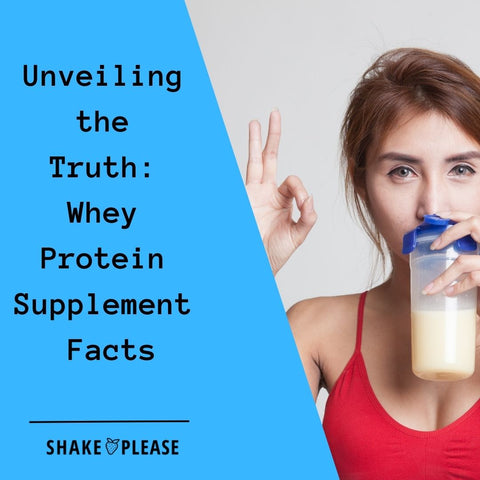
Introduction to Whey Protein Supplements
Whey protein supplements have become increasingly popular among fitness enthusiasts, athletes, and health-conscious individuals alike. These versatile supplements offer a wide range of benefits, from supporting muscle growth and recovery to aiding in weight management.
However, with the abundance of information (and misinformation) available, it can be challenging to separate fact from fiction.
In this comprehensive guide, we'll explore the truth behind whey protein supplements, their benefits, and how to incorporate them into your diet for optimal results.
What is Whey Protein?
Whey protein is a high-quality, complete protein derived from the liquid portion of milk that separates from the curds during the cheese-making process.
It is a rich source of essential amino acids, including branched-chain amino acids (BCAAs) like leucine, isoleucine, and valine, which play a crucial role in muscle protein synthesis and recovery.
The Benefits of Whey Protein Supplements
Incorporating whey protein supplements into your diet can provide a multitude of benefits:
-
Muscle Growth and Repair: Whey protein is highly bioavailable, meaning your body can efficiently absorb and utilize the amino acids to support muscle protein synthesis and facilitate muscle growth and repair.
-
Improved Recovery: The BCAAs in whey protein can help reduce muscle damage and soreness, allowing you to recover faster from intense workouts.
-
Weight Management: Whey protein can help you feel fuller for longer, supporting your weight management efforts by reducing hunger and cravings.
-
Immune System Support: Whey protein contains immunoglobulins and lactoferrin, which can help strengthen your immune system and protect against illness.
-
Bone Health: Whey protein is a good source of calcium, which is essential for maintaining strong, healthy bones.
How to Choose the Right Whey Protein Supplement
With so many whey protein supplements on the market, it's crucial to choose the right one for your needs. Consider the following factors when selecting a whey protein supplement:
-
Protein Source: Look for a supplement that uses high-quality whey protein isolate or concentrate as the primary protein source.
-
Protein Content: Aim for a supplement that provides at least 20 grams of protein per serving to ensure you're getting a sufficient amount.
-
Purity and Ingredients: Avoid supplements with unnecessary additives, fillers, or artificial sweeteners. Opt for a clean, minimally processed formula.
-
Taste and Texture: Choose a flavor and texture that you enjoy, as this will make it easier to incorporate the supplement into your diet.
-
Third-Party Testing: Look for supplements that have been tested and certified by independent organizations to ensure quality and safety.
Whey Protein vs. Other Protein Sources
While whey protein is a highly effective protein source, it's not the only option. Let's compare whey protein to other popular protein sources:
| Protein Source | Protein Content | Absorption Rate | Other Considerations |
|---|---|---|---|
| Whey Protein | High | Rapid | Excellent source of BCAAs |
| Casein Protein | High | Slow | Promotes sustained muscle growth |
| Soy Protein | Moderate | Moderate | May have estrogenic effects |
| Plant-Based Proteins (e.g., pea, rice, hemp) | Moderate | Varies | May be lower in certain amino acids |
| Whole Foods (e.g., chicken, fish, eggs) | High | Varies | Provide additional nutrients beyond just protein |
Whey Protein Supplement Facts and Myths
It's important to separate fact from fiction when it comes to whey protein supplements. Let's debunk some common misconceptions:
Myth: Whey Protein is Only for Bodybuilders
Fact: Whey protein is beneficial for individuals of all fitness levels, from casual exercisers to elite athletes. It can support a wide range of fitness goals, including weight management, muscle maintenance, and overall health.
Myth: Whey Protein Causes Kidney Damage
Fact: There is no scientific evidence to suggest that whey protein, when consumed in recommended amounts, poses any risk to kidney health. However, individuals with pre-existing kidney conditions should consult with a healthcare professional before using whey protein supplements.
Myth: Whey Protein Causes Bloating and Digestive Issues
Fact: Some individuals may experience temporary bloating or digestive discomfort when first incorporating whey protein into their diet. This is often due to the body adjusting to the increased protein intake. Gradually increasing the amount of whey protein and staying hydrated can help mitigate these side effects.
Common Misconceptions about Whey Protein Supplements
In addition to the myths mentioned above, there are several other common misconceptions about whey protein supplements:
-
Whey Protein Causes Weight Gain: Whey protein, when consumed as part of a balanced diet and exercise routine, can actually support weight management by promoting feelings of fullness and helping to preserve muscle mass during weight loss.
-
Whey Protein is Only for Men: Whey protein is beneficial for both men and women, as it can support a variety of fitness goals, from muscle building to weight loss and overall health.
-
Whey Protein is Unsafe for Pregnant or Breastfeeding Women: Unless otherwise advised by a healthcare professional, whey protein supplements are generally considered safe for pregnant and breastfeeding women when consumed in moderation.
-
Whey Protein is Addictive: Whey protein is not an addictive substance. It is a safe, natural supplement that can be a valuable part of a healthy, balanced diet.
Incorporating Whey Protein Supplements into Your Diet
Whey protein supplements can be easily incorporated into your daily routine in a variety of ways:
-
Protein Shakes and Smoothies: Mix whey protein powder with water, milk, or your favorite plant-based milk for a quick and nutritious post-workout shake or smoothie.
-
Baked Goods: Add whey protein powder to muffins, pancakes, or other baked goods to boost the protein content.
-
Oatmeal and Yogurt: Stir whey protein into your morning oatmeal or mix it into Greek yogurt for a protein-packed breakfast.
-
Snacks and Bars: Look for whey protein-based snacks, bars, or protein bites to enjoy as a healthy, on-the-go option.
Delicious Whey Protein Shake and Smoothie Recipes
Incorporating whey protein into your diet doesn't have to be boring. Try these tasty and nutritious shake and smoothie recipes:
-
Chocolate Peanut Butter Protein Shake: Blend together whey protein powder, peanut butter, cocoa powder, banana, and your choice of milk or non-dairy milk.
-
Berry Blast Smoothie: Combine whey protein powder, frozen berries, Greek yogurt, and a touch of honey or maple syrup for a refreshing and antioxidant-rich smoothie.
-
Tropical Mango Smoothie: Mix whey protein powder, mango, pineapple, coconut milk, and a squeeze of lime for a taste of the tropics.
-
Vanilla Chai Protein Shake: Blend whey protein powder, unsweetened almond milk, vanilla extract, and a dash of cinnamon and nutmeg for a cozy, spiced treat.
THE PERFECT FROZEN PROTEIN SHAKE
Whey Protein Supplement Safety and Side Effects
When consumed in recommended amounts, whey protein supplements are generally safe and well-tolerated. However, it's important to be aware of potential side effects and to consult with a healthcare professional if you have any concerns:
-
Digestive Discomfort: Some individuals may experience temporary bloating, gas, or diarrhea when first incorporating whey protein into their diet. Gradually increasing the amount and staying hydrated can help mitigate these effects.
-
Kidney Strain: While there is no evidence that whey protein causes kidney damage in healthy individuals, those with pre-existing kidney conditions should consult with a healthcare professional before using whey protein supplements.
-
Allergic Reactions: Some people may be allergic to the milk proteins found in whey protein. If you experience any adverse reactions, such as rash, hives, or difficulty breathing, discontinue use and seek medical attention.
-
Interactions with Medications: Whey protein may interact with certain medications, such as blood thinners or diabetes medications. If you are taking any prescription drugs, consult with your healthcare provider before using whey protein supplements.
Whey Protein Supplements for Different Fitness Goals
Whey protein supplements can be tailored to support a wide range of fitness goals:
-
Muscle Building: Look for whey protein isolate or concentrate supplements with a high protein content to support muscle growth and recovery.
-
Weight Loss: Opt for a whey protein supplement that can help you feel fuller for longer and preserve lean muscle mass during weight loss.
-
Endurance Performance: Choose a whey protein supplement that also contains carbohydrates and electrolytes to fuel your endurance activities.
-
General Health and Wellness: Select a high-quality, minimally processed whey protein supplement to support overall health and well-being.
HOW REPLACING TWO MEALS WITH PROTEIN SHAKES CAN TRANSFORM YOUR HEALTH
Conclusion and Final Thoughts
Whey protein supplements can be a valuable addition to your diet, providing a convenient and effective way to support your fitness goals, from muscle building to weight management and beyond.
By understanding the facts about whey protein and how to choose the right supplement for your needs, you can unlock the full potential of this versatile nutrient.





